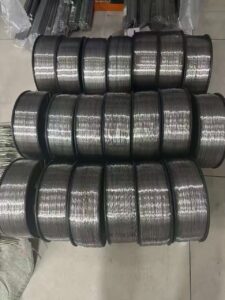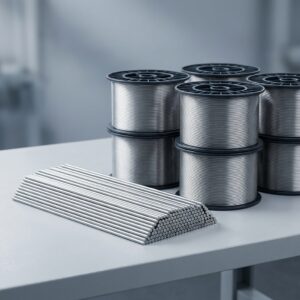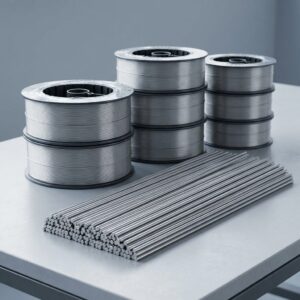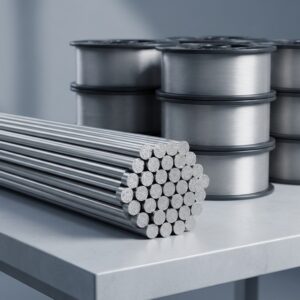Overview
Titanium wire IMI834 is a premium-grade titanium alloy wire that offers exceptional strength, corrosion resistance, and biocompatibility. Developed by the International Metalworking Industries (IMI) Group, this alloy has become a go-to choice for various industries, including aerospace, medical, and chemical processing. With its unique properties, IMI834 titanium wire has proven to be an invaluable material for applications that demand high performance and reliability.
Composition and Properties
IMI834 titanium wire is an alpha-beta alloy composed primarily of titanium, aluminum, vanadium, and iron. This carefully engineered composition gives the wire its remarkable characteristics:
- High Strength-to-Weight Ratio: Titanium is known for its exceptional strength-to-weight ratio, and IMI834 wire takes this advantage even further. It offers superior tensile strength while remaining lightweight, making it an ideal choice for weight-sensitive applications.
- Excellent Corrosion Resistance: The presence of aluminum and vanadium in the alloy provides outstanding resistance to various forms of corrosion, including general, crevice, and pitting corrosion. This property makes IMI834 wire suitable for use in harsh environments, such as seawater or chemical processing plants.
- Biocompatibility: Titanium alloys, including IMI834, are highly biocompatible, meaning they are non-toxic and well-tolerated by the human body. This characteristic makes IMI834 wire an excellent choice for medical implants, surgical instruments, and other biomedical applications.
- High Temperature Performance: IMI834 wire can withstand elevated temperatures without significant loss of strength or other properties. This heat resistance makes it suitable for applications in high-temperature environments, such as aerospace and automotive industries.
Applications
The unique combination of properties exhibited by IMI834 titanium wire has led to its widespread adoption across various industries:
- Aerospace: IMI834 wire is widely used in aircraft components, such as landing gear, fasteners, and engine components, where high strength, lightweight, and corrosion resistance are critical.
- Medical Devices: Due to its biocompatibility and corrosion resistance, IMI834 wire is an ideal material for medical implants, surgical instruments, and other biomedical devices.
- Chemical Processing: The excellent corrosion resistance of IMI834 wire makes it suitable for use in chemical processing equipment, such as heat exchangers, piping systems, and reaction vessels.
- Automotive: The high strength-to-weight ratio and temperature resistance of IMI834 wire make it a desirable material for automotive applications, including suspension components, engine parts, and exhaust systems.
- Energy: IMI834 wire finds applications in the energy industry, particularly in offshore oil and gas exploration and production, where corrosion resistance and durability are essential.
Manufacturing Process
The production of IMI834 titanium wire involves several steps to ensure consistent quality and performance:
- Melting and Casting: Raw materials are melted and cast into ingots using advanced melting techniques, such as vacuum arc remelting (VAR) or plasma arc melting (PAM), to ensure high purity and homogeneity.
- Hot Working: The ingots undergo hot working processes, such as forging or rolling, to break down the cast structure and achieve the desired mechanical properties.
- Cold Drawing: The hot-worked material is then cold-drawn through a series of dies to reduce the cross-sectional area and produce the desired wire diameter and surface finish.
- Heat Treatment: Depending on the specific application requirements, IMI834 wire may undergo various heat treatment processes, such as solution annealing or aging, to optimize its mechanical properties.
- Quality Control: Rigorous quality control measures, including chemical analysis, mechanical testing, and non-destructive evaluation, are implemented throughout the manufacturing process to ensure the wire meets the stringent specifications.
Advantages and Challenges
Advantages:
- Exceptional strength-to-weight ratio
- Outstanding corrosion resistance
- Biocompatibility
- High-temperature performance
- Long service life
- Versatility across various industries
Challenges:
- Higher cost compared to some other materials
- Limited formability and weldability
- Strict manufacturing requirements for quality control
- Potential for hydrogen embrittlement in certain environments
Ongoing Research and Development
The titanium industry continues to invest in research and development efforts to further enhance the properties and performance of IMI834 and other titanium alloys. Areas of focus include:
- Alloy Development: Researchers are exploring new alloying elements and compositions to improve specific properties, such as strength, corrosion resistance, or biocompatibility, while maintaining the desirable characteristics of titanium.
- Manufacturing Techniques: Advancements in manufacturing processes, such as additive manufacturing (3D printing) and advanced forming techniques, aim to improve efficiency, reduce costs, and enable the production of complex geometries.
- Surface Modifications: Various surface treatment methods, such as coatings, surface texturing, or ion implantation, are being investigated to enhance the performance of titanium wires and components in specific applications.
- Sustainability: Efforts are underway to improve the sustainability of titanium production, including recycling techniques, energy-efficient processes, and minimizing environmental impact.
FAQs
Q1: What makes IMI834 titanium wire different from other titanium alloys?
IMI834 titanium wire is an alpha-beta alloy specifically engineered to provide a unique combination of high strength, excellent corrosion resistance, and biocompatibility. The careful balance of alloying elements, such as aluminum, vanadium, and iron, contributes to its exceptional properties.
Q2: Is IMI834 titanium wire suitable for medical implants?
Yes, IMI834 titanium wire is highly biocompatible, making it an excellent choice for medical implants and other biomedical applications. Its non-toxic nature and resistance to corrosion in the body ensure safety and longevity for implanted devices.
Q3: How does the strength of IMI834 titanium wire compare to other materials?
IMI834 titanium wire offers an exceptional strength-to-weight ratio, surpassing many other metals and alloys. Its high tensile strength, combined with its lightweight nature, makes it an attractive choice for applications where weight is a critical factor, such as aerospace and automotive industries.
Q4: Can IMI834 titanium wire be welded?
While titanium alloys, including IMI834, generally have limited weldability due to their reactive nature and potential for contamination, advanced welding techniques, such as gas tungsten arc welding (GTAW) or laser beam welding, can be employed with proper precautions and controlling the welding environment.
Q5: What are the typical applications of IMI834 titanium wire in the aerospace industry?
In the aerospace industry, IMI834 titanium wire is widely used for various aircraft components, including landing gear, fasteners, engine components, and structural elements. Its high strength, lightweight, and corrosion resistance make it an ideal material for these critical applications.





